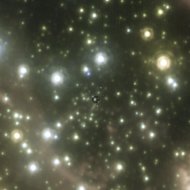 Large Hadron Collider scientists including a group from the UK believe they have detected their first new subatomic particle. Known as Chi (the Greek X symbol) b (3P), it is a "boson" like the fabled Higgs particle believed to underpin mass.
Large Hadron Collider scientists including a group from the UK believe they have detected their first new subatomic particle. Known as Chi (the Greek X symbol) b (3P), it is a "boson" like the fabled Higgs particle believed to underpin mass.
Chib(3P) provides a new way of combining two other elementary particles, the "beauty" quark and its antiquark, so that they bind together. Quarks are the building blocks of protons and neutrons, which form the cores of atoms.
Large Hadron Collider team detect 'new particle'
Scientists find monster black holes, biggest yet
 Scientists have found the biggest black holes known to exist -- each one 10 billion times the size of our sun. A team led by astronomers at the University of California, Berkeley, discovered the two gigantic black holes in clusters of elliptical galaxies more than 300 million light years away. That's relatively close on the galactic scale.
Scientists have found the biggest black holes known to exist -- each one 10 billion times the size of our sun. A team led by astronomers at the University of California, Berkeley, discovered the two gigantic black holes in clusters of elliptical galaxies more than 300 million light years away. That's relatively close on the galactic scale.
"They are monstrous," Berkeley astrophysicist Chung-Pei Ma told reporters. "We did not expect to find such massive black holes because they are more massive than indicated by their galaxy properties. They're kind of extraordinary."
New test finds reutrinos still faster than light
A new experiment appears to provide further evidence that Einstein may have been wrong when he said nothing could go faster than the speed of light, a theory that underpins modern thinking on how the universe works.
The new evidence, challenging a dogma of science that has held since Albert Einstein laid out his theory of relativity in 1905, appeared to confirm a startling finding that sub-atomic particles called neutrinos could travel fractions of a second faster.
Pristine Big Bang Gas Found
 Scientists have found two interstellar clouds of original gas, which -- unlike everything else in the universe -- has never mingled with elements forged later in stars. The existence of pristine gas that formed minutes after the Big Bang explosion some 13.7 billion years ago, had been predicted, but never before observed.
Scientists have found two interstellar clouds of original gas, which -- unlike everything else in the universe -- has never mingled with elements forged later in stars. The existence of pristine gas that formed minutes after the Big Bang explosion some 13.7 billion years ago, had been predicted, but never before observed.
The clouds, which are located about 12 billion light-years from Earth within the constellations Ursa Major and Leo, were found serendipitously during an ongoing study to characterize gas in distant galaxies.
World's most powerful laser to tear apart the vacuum of space
 Due to follow in the footsteps of the Large Hadron Collider, the latest "big science" experiment being proposed by physicists will see the world's most powerful laser being constructed.
Due to follow in the footsteps of the Large Hadron Collider, the latest "big science" experiment being proposed by physicists will see the world's most powerful laser being constructed.
Capable of producing a beam of light so intense that it would be equivalent to the power received by the Earth from the sun focused onto a speck smaller than a tip of a pin, scientists claim it could allow them boil the very fabric of space – the vacuum.
Bones From The Badlands Belong To New Dinosaur
 Researchers made quite a find this week in Utah: a new species of raptor dinosaur. The ancient creature, a meat-eater, was small and fast, with talon-like toes.
Researchers made quite a find this week in Utah: a new species of raptor dinosaur. The ancient creature, a meat-eater, was small and fast, with talon-like toes.
"These animals were incredibly fast, incredibly intelligent and some of them wielded very significant claws and sharp teeth," Dr. Lindsay Zanno of the New University of Wisconsin tells NPR's Scott Simon. Zanno led the dig team that made the discovery.
Here Come The Suns: New Planet Orbits Two Stars
 A trillion is a huge number — when you're talking dollars or euros. But a trillion miles is not so much in the cosmic scheme of things. Astronomers say they've now found a planet that orbits two suns a mere thousand trillion miles from here. It's yet another example of a weird solar system being discovered around nearby stars.
A trillion is a huge number — when you're talking dollars or euros. But a trillion miles is not so much in the cosmic scheme of things. Astronomers say they've now found a planet that orbits two suns a mere thousand trillion miles from here. It's yet another example of a weird solar system being discovered around nearby stars.
Two years ago, NASA launched the Kepler observatory to look for Earth-like planets beyond our own solar system. It has found more than 1,000 apparent planets around distant suns.
More Articles...
Page 37 of 61

 Science Glance
Science Glance






























